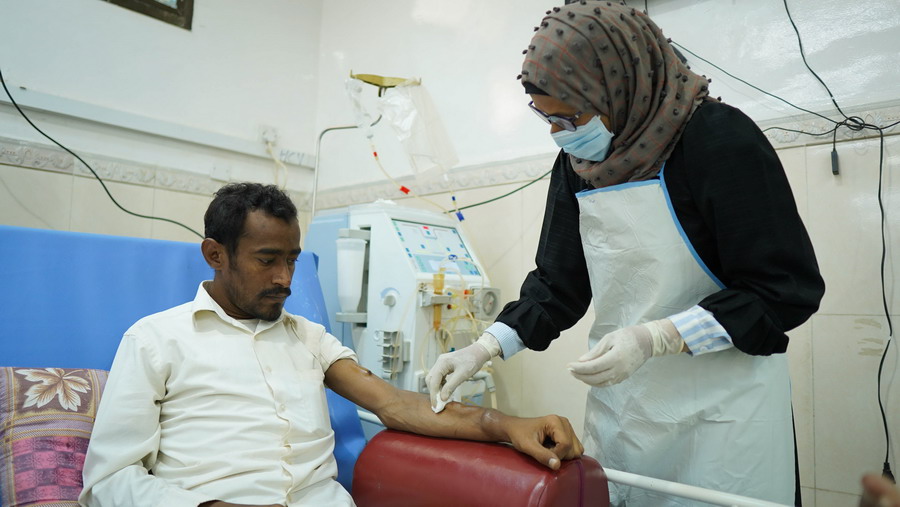 Osama, 28, receives treatment in Al Sadqqah Hospital in Aden
Osama, 28, receives treatment in Al Sadqqah Hospital in Aden
31 August 2020 – Over 5 years of hostilities in Yemen have resulted in a massive setback to an already weak health care system and led to a dramatic collapse of health care services provided to the population. More than 17.9 million people out of the total population of 30 million require health care services in 2020, while only half of the health facilities are fully functioning.
The dialysis centre also face a severe shortfall of essential supplies such as medication and fuel to run hospital equipment, as well as a lack of funds to pay health care workers regularly.
Dheya has been working as a nurse in Al Sadqqah Hospital's dialysis centre in Aden for the last 6 years. She has witnessed the torment of kidney failure patients, and the decreasing capacity of the hospital to treat the patients properly.
"Without dialysis consumables and supplies, the suffering of these patients is unbearable. But because of the lack of medical supplies, we often had no other choices than to reduce the duration or the frequency of the dialysis sessions,” said Dheya.
"Limited access to dialysis sessions and treatment put the lives of these vulnerable patients at higher risk, not to mention the suffering they go and their families through because of the lack of treatment," said Dr Abdulwahab Al-Nehmi, Noncommunicable Disease Officer at the WHO country office in Yemen.
A partnership between WHO, KSrelief and the Government of Kuwait has helped support patients suffering from renal failure in Yemen through the provision of access to healthcare. Between September 2019 and May 2020, up to 110 340 dialysis sessions were delivered to more than 4300 patients with chronic kidney failure.
KSrelief has covered up to 80% of the total cost of the dialysis sessions in all 21 centres across the country. WHO has provided up to US$ 24 million worth in supplies to cover the life-saving treatment needs of patients living with chronic, life-threatening conditions (cancer, kidney failure and noncommunicable diseases, including diabetes).
Osama is 28 years old. He is one of the patients receiving dialysis treatment at Al-Sadaqa hospital. "Being a dialysis patient is very challenging. Receiving treatment is also a challenge, but those dialysis sessions have made a positive difference in my life. I am gradually feeling better, and I can feel that my health is improving," he said.
"As a health worker, witnessing my patients' health condition stabilize and improve through treatment is what gives me the energy to continue my mission despite the hardship," says Dheya.
Despite the long-standing efforts of WHO and partners in coordination with health authorities, significant gaps remain due to funding shortages to the humanitarian response in Yemen under the throes of the collapse of public institutions. Continued support is still needed to save the lives of the most vulnerable, including renal failure patients.


